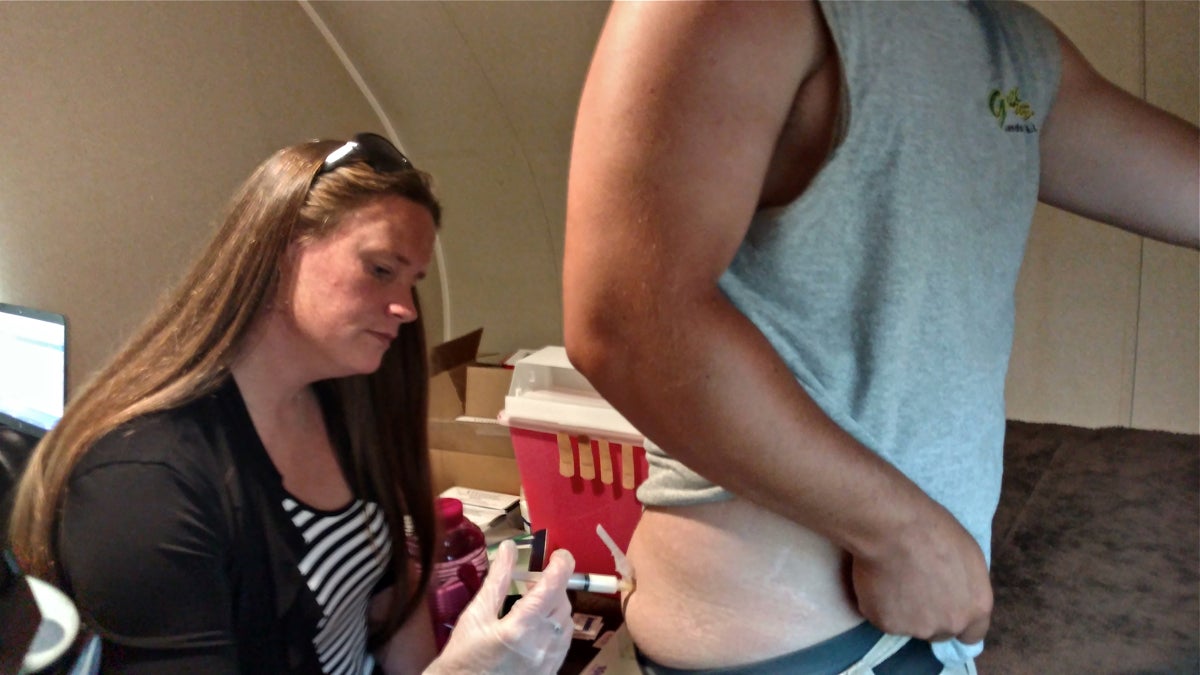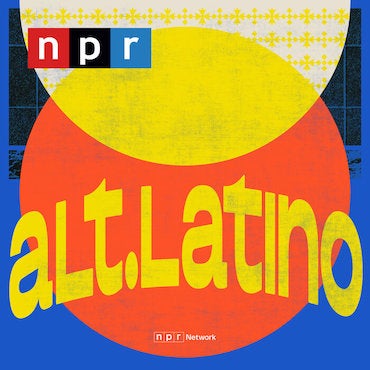Pa. prisons offering inmates addiction treatment on their way out, but is it working?
Listen
Amanda Cope, registered nurse and CEO of Positive Recovery Solutions, gives patient Jacob Schmell his monthly Vivitrol injection, a medication that helps curb cravings for drugs and alcohol. (Katie Colaneri/WHYY)
By now, you’ve probably seen the ads on billboards and buses for Vivitrol — a drug that blocks the effects of alcohol and opioids. But before this marketing blitz, the drug maker took its pitch to places outside the public view: prisons.
For the 68 percent of Pennsylvania inmates who struggle with substance abuse, the first year after their release is critical: They’re at a high risk of overdosing and committing new crimes.
In 2014, Pennsylvania’s Department of Corrections turned to Vivitrol in hopes it would give those getting out of state prisons better odds of staying clean and staying out.
“I can’t think of any chronic disease that you would not look at medication as being a viable option,” said Steve Seitchik, statewide coordinator for the DOC’s medication assisted treatment program.
Vivitrol, or “extended-release naltrexone,” works by blocking the opioid receptors on your brain, so if you were to use heroin, for example, you wouldn’t feel high. Naltrexone has been available in daily pill form since the 1970s. The FDA first approved the longer-lasting Vivitrol injection to treat alcohol abuse disorder in 2006.
The monthly shot, in combination with counseling, is a more effective way to break the cycle of addiction and incarceration that for many people, costs them their lives, said Seitchik.
“Just keeping people alive is goal number one,” he said.
So far, about 350 men and women have participated in the program, which is now offered in half the state’s prisons, according to DOC spokeswoman Amy Worden.
The drugmaker Alkermes provides the first shot for free. Then, the department works to keep participants on Vivitrol for 11 months after they’re released, often by helping them enroll in Medicaid so they can afford the shots, which go for about $1,000 each.
‘We’re keeping people out of the system’
For some of those leaving prison, the shots come to them in a mobile home-turned-clinic run by registered nurse, Amanda Cope.
During a recent stop in a parking lot in Lemoyne — a town in Cumberland County just across the Susquehanna River from Harrisburg — Cope plunges a needle into Jacob Schmell’s right buttock.
It takes her about 25 seconds to inject the full vial of Vivitrol, which will stay in his system for 28 days, unlike older anti-addiction drugs, buprenorphine and methadone that are taken every day.
Last year, the DOC contracted with Positive Recovery Solutions’ mobile unit to make sure former inmates can continue to get their monthly shots, especially in rural areas with fewer health care providers.
Cope estimates about 25 to 35 percent of her patients have criminal records. And as she travels across the western and central parts of the state, Cope says she’s seen positive results.
“When they are not obsessed and driven by that compulsion to go back out and use again because this medication takes that away for them, they’re working and they’re becoming functioning and productive members of society again,” she said.
“It benefits the taxpayers because we’re keeping people out of the system,” Cope added. “All these guys that continuously go back in on positive urine drug screens — those numbers are changing.”
But is Vivitrol really impacting relapse and recidivism rates?
That’s a question the DOC can’t answer yet, Worden said.
Researchers at Drexel University are studying the program to see how many former inmates on Vivitrol relapse and how many get arrested again during the first year they’re released. The DOC won’t be ready to release the results until later this year, Worden said.
In the meantime, the department is moving ahead with a plan to expand the Vivitrol program to all 27 state prisons. Eventually, the DOC said it plans to offer methadone and buprenorphine “where determined appropriate.”
A recent investigation by NPR found Alkermes is spending big money in states like Pennsylvania to lobby lawmakers and to push for bills that would make it harder for patients to access Vivitrol’s competitors.
Multiple studies have found all three drugs help prevent relapse, said Joshua Lee, an addiction specialist at New York University who led a large study on the use of Vivitrol among former offenders published last year in the New England Journal of Medicine. (Lee has received research dollars from Alkermes.)
But whether they make a dent in recidivism rates will be more difficult to show, Lee said.
“Re-incarceration is so multi-factorial,” he said. “It’s so based on race, class, community policing and government policy vis-à-vis incarceration. It is less dependent on whether somebody used heroin that day or that week.”
Similarly, Lee said researchers have not yet shown whether Vivitrol can prevent patients from overdosing.
That’s something Cope warns each of her patients about.
“There is absolutely a risk of overdose and death if a patient were to challenge this medication,” she said. “If they would pollute their system so much with an opiate that it was strong enough to push that naltrexone off of the receptor, you’ve got to assume that would be a lethal dose.”
‘Never made it this far without it’
Outside the Positive Recovery Solutions mobile unit, Jacob Schmell said he was skeptical when he first heard about a drug that could take away his cravings for heroin.
But after cycling in and out of jail and rehabs, he decided to give Vivitrol a try.
“Never made it this far without it,” he said. “This is the longest I’ve been clean since I started trying to get clean.”
Now, Schmell has a landscaping job, has reunited with his family and will be celebrating one year without drugs on July 17. Most of that time, he was behind bars. Now, he’s waiting to see how far Vivitrol can help get him on the outside.
WHYY is one of 15 news organizations in the Philadelphia Reentry Reporting Collaborative, a solutions-oriented focus on the issues facing formerly incarcerated Philadelphians. The aim is to produce journalism that speaks, across the city and across media platforms, to the challenges and solutions for reentry.
WHYY is your source for fact-based, in-depth journalism and information. As a nonprofit organization, we rely on financial support from readers like you. Please give today.

